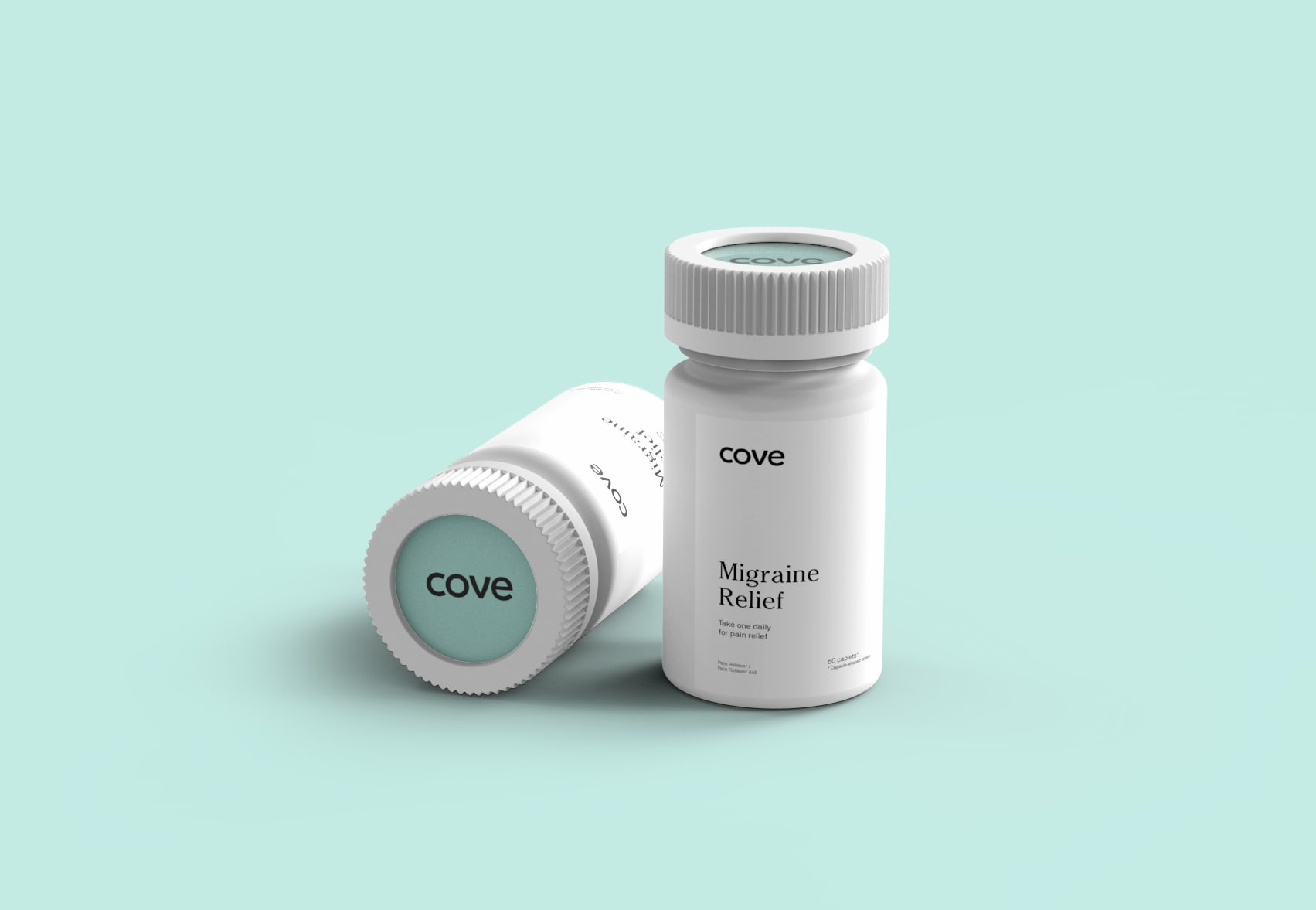If you’ve spent even 10 minutes googling remedies for your migraine headaches, you’ve probably read that you should try supplements.
(Actually, if you’ve searched for remedies for anything, you’ve probably seen them touted as the cure for what ails you—Vitamin D, for example, has been shown to do everything from treat psoriasis to prevent some cancers.)
And we get it: When you suffer from debilitating headaches, anything that claims it might aid in migraine prevention seems like it’s worth a try. But while supplements might be touted as a magic pill, there’s more to the story.
First, the good news: Studies have shown promising results on using them to treat migraine attacks. “I recommend supplements for almost all of my patients,” says Dr. Sara Crystal, board-certified neurologist, headache specialist, and Cove Medical Director.
But, like anything, they aren’t beneficial for everyone, and they can come with unintended side effects. “It’s important to consult with a medical provider to ensure that you are taking supplements that are safe and effective, and at the recommended doses,” adds Crystal. “Some have better evidence of efficacy than others, and some can potentially be harmful.”
What else should you know? Here are all the details on using supplements for migraine treatment.
What are supplements?
Let’s start with the basics: According to the National Institutes of Health, “supplements” is a catch-all term for products like vitamins (think Vitamin E or the Fred Flintstone chewable you took as a kid), minerals (such as calcium or iron), herbal foods like garlic, ginger, or echinacea, and products like probiotics.
Usually, these vitamins and nutrients can come from the foods you eat, assuming you have a balanced diet, but for some people, taking supplements can help balance out a deficiency or offer additional health benefits.
Most are available over the counter, but just because you can pick them up at your nearest Whole Foods, doesn’t mean you should, at least without consulting a medical provider. Again, different people have different reactions to these substances, and some may have unintended side effects or interact with other medications you’re taking.
How do supplements work to treat migraine?
Supplements can impact body and brain functions in all kinds of different ways, some of which have been shown to reduce migraine frequency or the severity of migraine headaches (or in some cases, both).
For some people, a deficiency in a vitamin or mineral may trigger an attack or increase its intensity, so balancing that with supplements can help.
With that said, no treatment is proven to work for everyone. As you probably already know, everyone’s migraine patterns are different—your triggers are different than your sister’s, and your frequency might be 3x what your co-worker experiences. And the treatment plan that works for others may not work for you.
How long do supplements take to work?
It’s a long, complex answer, but the short version is this: It depends on all kinds of things—like how deficient you are in the nutrient or mineral before you start taking a supplement, the cause of your deficiency in the first place, the dosage and quality of the pill you’re taking, and a variety of other factors that are unique to your body.
In any case, don’t expect to see results overnight—according to the American Migraine Foundation, you should expect to wait two to three months to see any results from the supplements that are commonly used for migraine treatment. Our advice: Ask your medical provider about the timeline you should anticipate based on your health and needs.
What supplements are best for migraine?
The three that the American Headache Society reports may prevent migraine attacks are riboflavin, CoQ10, and magnesium.
Riboflavin
Riboflavin—also known as Vitamin B2—is part of the B vitamin family, and it plays a role in helping the body break down foods and regulate energy supply. It’s found in dairy, grains, some meats, and many green vegetables, so it’s rare for most Americans to be deficient in this vitamin. With that said, it has been shown to play a part in migraine in several studies, including a study in the European Journal of Neurology that showed a significant reduction in migraine frequency for participants taking 400 mg of riboflavin a day for three months.
CoQ10
CoQ10 (or Coenzyme Q10) is an antioxidant chemical that the body produces naturally and can also be found in meat and seafood. Several studies have shown that taking CoQ10 can reduce both migraine frequency and severity—including, recently, a 2018 study among 45 women.
Magnesium
Magnesium impacts all kinds of things in the body—like regulating muscle function and keeping blood sugar levels stable—but it’s also been shown to play a role in migraine. According to a widely cited study, some people experience a drop in magnesium when experiencing a migraine attack. And according to the American Migraine Foundation, some studies have shown that taking magnesium reduces migraine frequency.
The Combination Effect
One study showed that taking a supplement containing a combination of magnesium, riboflavin, and CoQ10 for a three-month period showed a reduction of pain in migraine attacks. That's why we created Beam, a daily migraine supplement that combines these three effective nutrients in a unique, medical provider-recommended formula. You can learn more about Beam here.
But again, not all of these supplements—or a combination—is right for everyone, so talk to your medical provider to see what the best option or combination might be for you. “Even the supplements that have been shown to be safe and effective for migraine can have side effects,” Crystal adds. “For example, certain forms of magnesium are better tolerated than others, and Coenzyme Q10 can cause insomnia.”
Are there any other supplements to know about?
Yep, and it’s too many to list here. But two that you may come across pretty often are feverfew—an herb that touts headache-busting benefits—and butterbur, a medicinal shrub that’s been used to treat everything from stomach pain to UTIs (and yes, migraine).
While some people may report benefits from these supplements, and feverfew is considered safe by the National Institutes of Health, there are few studies on either, and the American Migraine Foundation suggests that current studies aren’t necessarily reliable. There are also side effects that make them a riskier choice. For example, Crystal shares, “the butterbur plant contains chemicals called pyrrolizidine alkaloids (PAs) that can be toxic to the liver, so only PA-free butterbur products should be used.”
On the other hand, some less rigorously tested supplements may actually be worth your time. A recent study published in the medical journal BMJ backed up earlier research that suggested that a diet rich in omega-3 fatty acids, essential nutrients found in fish and other foods, can help reduce the frequency and severity of migraine attacks. If you’re not a big fan of seafood, you may be able to get the same benefit by taking fish oil supplements. There aren’t many side effects of fish oil, and they’re generally mild (think: bad breath and a fishy aftertaste). That said, it is possible to get too much fish oil, so be sure to talk to a medical provider before starting any new supplements.
What supplements does Cove offer?
- Cove is the only place you can get Beam, a first-of-its-kind migraine supplement that combines the daily recommended doses of magnesium, riboflavin, and CoQ10 in a powder packet.
- Super B combines a recommended dose of riboflavin for migraine sufferers with three other B-vitamins (B6, B12, and folate or B9) that work together to help your body convert food into fuel, which can also mean more energy and healthier brain and blood cells for you.
- Oasis is a hydration supplement that helps your body replenish electrolytes you naturally lose throughout the day. It contains a clinically-effective dose of magnesium as well as sodium, potassium, calcium, and vitamins C, B6, and B12.
- Since essential oils can relieve migraine symptoms for some sufferers, Cove offers an Essential Oil Roll-On stick for fast relief.
- You can also order magnesium supplements individually through Cove. Get started here.
The bottom line: Supplements may be a promising component to a treatment plan for migraine headaches. But to make sure that they—or any form of care—are the right approach, talk to your Cove medical provider about the treatment option that makes the most sense for you.
The information provided in this article is not a substitute for professional medical advice, diagnosis, or treatment. You should not rely upon the content provided in this article for specific medical advice. If you have any questions or concerns, please talk to your medical provider.
These statements have not been evaluated by the FDA. This product is not intended to diagnose, treat, cure, or prevent any disease.


